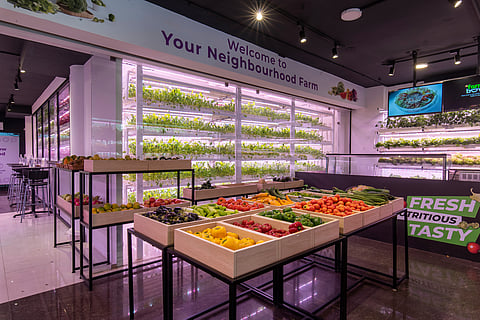
- Home
- EventsEvents
- Product Launches
- CategoriesCategories
- Advertise
- Opinion

BASF Venture Capital (BVC) invests in the Indian startup UrbanKisaan, specializing in hydroponic cultivation of various types of vegetables, greens, and herbs in tropical urban environments. This is BVC’s first investment in an early-stage business focusing on India. Conceptualized in 2017, UrbanKisaan operates several suburban greenhouses and vertical indoor farms in Hyderabad and Bangalore. The company sells fresh produce, some of which is grown directly in the shops, in its franchise-owned brick-and-mortar stores and via an app and website. Both parties agreed not to disclose the financial details of the investment.
UrbanKisaan has optimized hydroponics technology for use in tropical climates such as India. With only one-tenth of the costs, the proprietary technology is significantly more efficient than conventional global standards in hydroponics cultivation. The company is also capitalizing on online food retailing, which is booming on the subcontinent. “Our approach in hydroponics enables us to produce our food cost-effectively and with relatively little effort,” said Vihari Kanukollu, co-founder and chief executive officer at UrbanKisaan.
“Our produce also contributes towards sustainability as it is grown in clean, hygienic farms in and around the city, thus minimizing the total carbon footprint. Use of IoT (Internet-of-Things)-enabled technology for monitoring the farms ensures pesticide-free produce. The growing demand from our customers shows that our idea is well-received,” he added.
UrbanKisaan’s farms are managed through their proprietary technology. Nutrient content, pH levels, atmospheric humidity, CO2 concentration, light concentration, and other important parameters are controlled and adapted to the needs of the particular plants with an app.
“UrbanKisaan, as a pioneer in the hydroponics space, has developed a unique growing method and combines this with a compelling business model for sales,” commented Markus Solibieda, managing director of BASF Venture Capital. He added, “AgTech is one of our key investment focus areas worldwide. This includes, in particular, our goal of supporting innovative agricultural and food-related businesses in Asia. We look forward to learning more about hydroponic farming and exploring its potential through a close collaboration between UrbanKisaan and BASF’s agriculture experts.”
With the investment from BASF, UrbanKisaan plans to expand its market presence in India further, deploy its farming technology to work with thousands of farmers, and bring fresh, local, sustainable produce to urban dwellers.
Hydroponic farming – an efficient way to use limited resources
The world’s population is expected to reach 10 billion by 2050 (Reports from UN & IISD), while the area available for farming and freshwater reserves are becoming increasingly scarce. Hydroponics offers a sustainable way to grow crops without soil and vertically stacked layers while reducing water usage by about 90%. Water that the plants do not absorb is captured, purified and fed back into the farm’s water circulation system, minimizing wastage significantly. Especially in densely populated urban areas, this presents a more efficient way to use limited resources like water, space and manpower.
India is the second-largest producer of fruits and vegetables in the world, with a production value of about US $64 billion (Fruits & Vegetables Production value at Current Prices for 2015-16, Horticultural Statistics at a Glance 2018, Government of India, Ministry of Agriculture and Farmers Welfare). It is also a large consumer of fruits and vegetables. While much of this is through unorganized channels (local vegetable markets, hand-pulled carts and neighborhood stores), organized channels (modern trade and online retail) account for a little over 20% of the market(Avalon Consulting). Thus, hydroponics is a fast-growing and efficient alternative to traditional supply chains in the organized fresh produce market.
